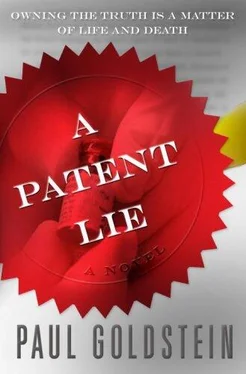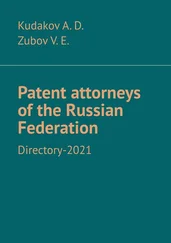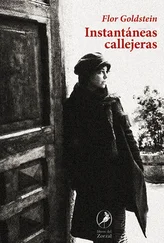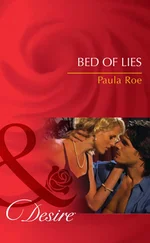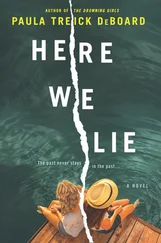Paul Goldstein - A Patent Lie
Здесь есть возможность читать онлайн «Paul Goldstein - A Patent Lie» весь текст электронной книги совершенно бесплатно (целиком полную версию без сокращений). В некоторых случаях можно слушать аудио, скачать через торрент в формате fb2 и присутствует краткое содержание. Жанр: Криминальный детектив, на английском языке. Описание произведения, (предисловие) а так же отзывы посетителей доступны на портале библиотеки ЛибКат.
- Название:A Patent Lie
- Автор:
- Жанр:
- Год:неизвестен
- ISBN:нет данных
- Рейтинг книги:3 / 5. Голосов: 1
-
Избранное:Добавить в избранное
- Отзывы:
-
Ваша оценка:
- 60
- 1
- 2
- 3
- 4
- 5
A Patent Lie: краткое содержание, описание и аннотация
Предлагаем к чтению аннотацию, описание, краткое содержание или предисловие (зависит от того, что написал сам автор книги «A Patent Lie»). Если вы не нашли необходимую информацию о книге — напишите в комментариях, мы постараемся отыскать её.
A Patent Lie — читать онлайн бесплатно полную книгу (весь текст) целиком
Ниже представлен текст книги, разбитый по страницам. Система сохранения места последней прочитанной страницы, позволяет с удобством читать онлайн бесплатно книгу «A Patent Lie», без необходимости каждый раз заново искать на чём Вы остановились. Поставьте закладку, и сможете в любой момент перейти на страницу, на которой закончили чтение.
Интервал:
Закладка:
“Could you leave me her telephone number and address? And tell Chris I'd like to see him.”
“She'll appreciate that,”Tina said.
“What's that?”
“Mrs. Pearsall. Your visiting her. Paying your respects.”
After Tina left, Seeley continued working down the list of witnesses, preparing for each a brief summary of his or her testimony, the first draft of his order of proof.
Other than the travel-poster view, the conference room was virtually identical to the dozens in which Seeley had spent a good part of his professional life, plotting strategy with his trial team, taking or defending depositions, negotiating settlements. Law firm interior designers all had the same shopping list: dark gleaming wood for the bookshelves and conference table, plump leather-and-steel chairs, chrome carafes and ice buckets to sit next to the telephone on the sleek credenza. On one off-white wall was a generic painting, neither offensive nor banal, that looked as if it had been ordered by the yard.
Seeley was near the end of the witness list when there was a knock at the open door and Chris Palmieri came in. In a firm where the younger lawyers went without ties and jackets, Palmieri wore a trimly cut gray suit, starched dress shirt, and silk tie. A pale pink pocket square was carefully folded to look like a casual afterthought, and his light hair was cropped close.
“Tina said you wanted to ask me about something.”
Seeley had wondered about Palmieri's prickliness not only when Tina introduced them in the workroom but also in their telephone conversations the week before. He assumed it was the young partner's resentment at being passed over to run the case when Pearsall died. But it could also have been ill will toward any lawyer who tried to replace his mentor and, probably, friend.
“Do you know where the Warren deposition is?”
“Warren?”
Seeley slid the witness binder down the conference table to where Palmieri was. “Lily Warren. The scientist who St. Gall says invented AV/AS first.” Vaxtek's case turned on its claim that one of its own scientists, Alan Steinhardt, invented AV/AS. If St. Gall could prove that Warren invented AV/AS first, it would win.
“Oh, her.” He left the binder on the conference table, unopened. “We didn't depose her.”
Seeley waited. Not to depose a key witness was unthinkable.
“St. Gall dropped her. It turns out she's a crackpot. They were afraid her testimony would backfire on them.”
In a deposition, the deposing attorney-for Warren it would have been Pearsall or another Heilburn, Hardy lawyer-gets to ask the witness anything he wants. If, on questioning, Warren said something that hurt Vaxtek's position, the deposition transcript would be there to warn the lawyer against asking the same question at trial. However, if Warren said something that was favorable to Vaxtek and later contradicted herself at trial, Vaxtek could introduce the deposition transcript to impeach her testimony. Otherwise, no member of the jury would ever get to see the deposition. From Vaxtek's viewpoint deposing Warren was a no-lose proposition. Why, then, hadn't its lawyer done so?
“So there's no record of her story?”
“I think she talked to one of the newspapers, maybe the Chronicle, but after St. Gall dropped her, there wasn't a story.” Palmieri tilted his chair back from the table and closed his eyes. “No deposition, either.”
“Do you know how we can reach her?”
Palmieri was looking at him again, but made no effort to hide how boring he found this. “I think St. Gall fired her right after they cut her from the witness list.”
“You'd think Pearsall would want to get her story down, for the record. She could still turn out to be a problem for us.”
Palmieri flushed. He half rose and leaned over the table. “Warren was St. Gall's witness, not ours.” For the first time, he looked squarely at Seeley. “Bob never missed an angle that mattered.”
“I'm not saying he did. He may have been planning to depose her when he died.” Seeley didn't mind that Palmieri idolized his mentor; he admired loyalty. But if they were going to work together, the young partner would have to calm down. “Did Pearsall seem any different before he died? Had he changed?”
Palmieri drew back. “You mean, what happened that he would throw himself in front of a train?” He started to answer his own question, but changed his mind. “Bob was as passionate about this case as he was about all his cases.”
That told Seeley nothing. What looks like passion can in fact be nothing more than a driving fear of failure. In his last years in New York, even as he was winning most of his cases and favorably settling the others, Seeley could never shake the conviction that he had failed his clients by not obtaining a larger damage award or more generous settlement terms.
“Maybe Warren isn't a problem,” Seeley said, “but I want to nail this down. If there's someone out there with a halfway legitimate claim that he-or she-made this invention before Steinhardt did, I need to know it before I put him on the stand. I'm seeing him this afternoon, but I want you to go through his lab notes and mark anything that could raise a question.”
Again Palmieri reddened, and this time Seeley caught the meaning at once.
“This is too important for an associate. If it weren't important I wouldn't ask you to do it. I'll look at whatever you come up with tomorrow morning.”
Palmieri pushed back to leave.
“Look, Chris, when Vaxtek asked me to take this case, I told them they should let the second chair run it, but they wouldn't listen.”
“What did they say?”
“That you didn't have enough experience.”
“And you believe that?”
“It wasn't my decision to make.” Seeley remembered the missing trial notebook. “Did you get a look at Pearsall's trial notes?”
Palmieri said, “Look, Mr. Seeley-”
“The people I work with call me Mike. What about the notebook?”
“He didn't keep one.”
“You're sure of that.”
“I worked for Bob from the day I started here. Eleven years. He never kept a trial notebook. Maybe it's something New York lawyers do.”
Seeley was growing tired of the barbs. “Did he talk to you about his theory of the case?”
“Sure. Except he didn't call it that. For him it was the ‘path to victory. ’ We worked it out together.”
“And what does it look like-Vaxtek's path to victory?”
“Nothing that would surprise you: Vaxtek's a small American company that has nothing going for it except the brilliance, creativity, and dedication of its handful of scientists and the protection of the American patent system. St. Gall is a multinational octopus that knows nothing about science, lacks any creative aptitude or spirit, and survives by poaching on the hard work of small companies like Vaxtek.”
“And what's Emil Thorpe's ‘path to victory’ going to be?” Thorpe, St. Gall's lead trial counsel, was a legend of the San Francisco trial bar and, for major cases like this one, was at or near the top of the list of preferred counsel for any company that could afford him. Seeley guessed that Vaxtek would have hired Thorpe if St. Gall didn't already have him on retainer.
“Bob and I never got the chance to talk about it.” Palmieri was at the conference-room door, looking down the corridor.
Seeley wondered if he was like this with everyone, or reserved his detachment for interlopers.
“You're running this case,” Palmieri said, “so you get to choose your second chair. If you want to work with someone else, that's fine with me. I'll do everything I can to support him.”
Seeley had reservations about Palmieri, but he knew that if he hesitated for a moment he would lose him. “You're the one I want sitting next to me at counsel's table.”
Читать дальшеИнтервал:
Закладка:
Похожие книги на «A Patent Lie»
Представляем Вашему вниманию похожие книги на «A Patent Lie» списком для выбора. Мы отобрали схожую по названию и смыслу литературу в надежде предоставить читателям больше вариантов отыскать новые, интересные, ещё непрочитанные произведения.
Обсуждение, отзывы о книге «A Patent Lie» и просто собственные мнения читателей. Оставьте ваши комментарии, напишите, что Вы думаете о произведении, его смысле или главных героях. Укажите что конкретно понравилось, а что нет, и почему Вы так считаете.
